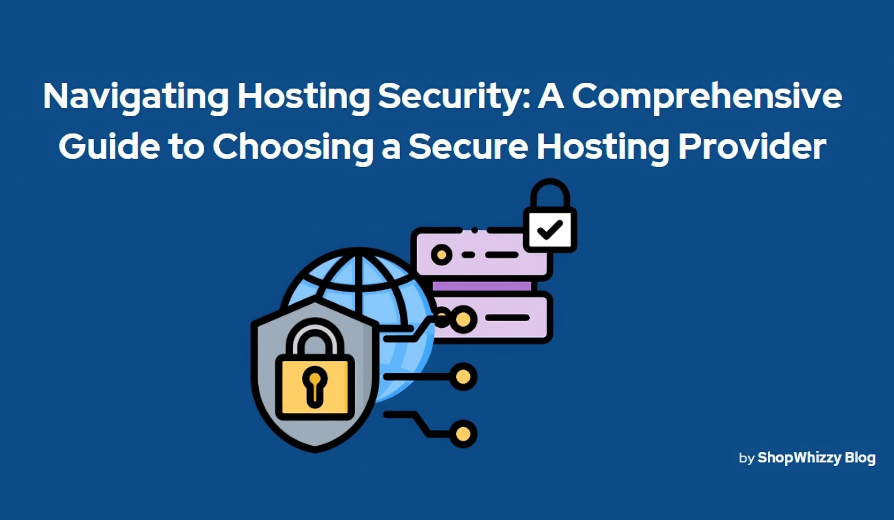Navigating Hosting Security: A Comprehensive Guide to Choosing a Secure Hosting Provider
-

- Blog
- Jun 7, 2024
- 0views
- Reading time: 4 minutes

Introduction
In an era where digital transactions and interactions dominate, the security of your online presence is paramount. Your hosting provider serves as the foundation of this security architecture. This guide delves deep into the intricacies of hosting security, offering an exhaustive exploration to equip you with the knowledge needed to make informed decisions when selecting a hosting provider that not only meets but exceeds your security expectations.
Understanding Different Types of Hosting Services
Before diving into the specifics of hosting security, it's essential to comprehend the spectrum of hosting services available. Shared hosting, Virtual Private Server (VPS), dedicated, and cloud hosting each offer distinct advantages and security implications that merit careful consideration.
Shared Hosting
Shared hosting, often the entry point for websites due to its affordability, entails sharing server resources with multiple other websites. While cost-effective, this communal environment poses inherent security risks, such as cross-site contamination and resource abuse, necessitating proactive security measures to mitigate potential vulnerabilities.
VPS Hosting
VPS hosting bridges the gap between shared and dedicated hosting by allocating users a dedicated portion of server resources within a virtualized environment. This segmentation enhances security and control compared to shared hosting, making it an ideal choice for businesses seeking a balance between cost-effectiveness and security.
Dedicated Hosting
Dedicated hosting offers unparalleled security and control by providing users with exclusive access to an entire physical server. This isolation minimizes the risk of security breaches stemming from neighboring websites and affords extensive customization options for implementing stringent security measures tailored to specific business needs.
Cloud Hosting
Cloud hosting revolutionizes the hosting landscape by leveraging distributed infrastructure to deliver scalability, resilience, and flexibility. However, the distributed nature of cloud environments introduces unique security challenges, such as data privacy concerns, shared responsibility models, and the dynamic allocation of virtualized resources, necessitating robust security measures tailored to cloud environments.
Security Implications of Each Hosting Type
Each hosting type presents its own set of security implications that must be carefully evaluated. From the shared resources of shared hosting to the isolation of dedicated servers and the dynamic nature of cloud environments, understanding these implications is crucial for implementing effective security measures tailored to your specific hosting environment.
Key Security Features to Look for in a Hosting Provider
When evaluating hosting providers, a comprehensive suite of security features should be a top priority. Beyond fundamental measures like SSL certificates and firewalls, look for providers that offer advanced threat detection and mitigation capabilities, proactive security monitoring, and regular security updates to stay abreast of emerging threats and vulnerabilities.
Role of Automated Backups and Disaster Recovery Plans
Automated backups and disaster recovery plans serve as the backbone of resilience in the face of potential data loss or downtime. Ensure your hosting provider implements robust backup mechanisms with off-site redundancy and comprehensive disaster recovery strategies to minimize the impact of unforeseen events on your business operations and data integrity.
Evaluating the Security Infrastructure of Hosting Providers
Scrutinizing the security infrastructure of hosting providers goes beyond surface-level assurances. Look for providers with state-of-the-art data centers equipped with physical security measures such as biometric access controls, surveillance systems, and redundant power and network connectivity. Additionally, inquire about their adherence to industry-standard security certifications and the frequency and rigor of their security audits to ensure a robust security posture.
Reputation and Reliability of Hosting Providers
A hosting provider's reputation and reliability are indicative of their commitment to delivering secure and dependable services. Conduct thorough research into customer reviews, testimonials, and industry accolades to assess their track record in providing responsive support, maintaining high uptime guarantees, and swiftly addressing security incidents to safeguard your online presence and business continuity.
Data Privacy and Legal Compliance
In an era of increasingly stringent data privacy regulations and consumer expectations, ensuring your hosting provider complies with relevant laws and regulations is paramount. Seek providers that demonstrate adherence to frameworks such as GDPR, HIPAA, and SOC 2 compliance, showcasing their commitment to safeguarding sensitive data and maintaining trust with your customers.
Customer Support and Incident Response
Responsive and knowledgeable customer support is indispensable when it comes to addressing security concerns and resolving issues expediently. Evaluate the availability of support channels, response times, and the expertise of support staff in handling security-related inquiries and incidents to ensure timely resolution and minimal disruption to your business operations.
Cost vs. Security: Finding the Right Balance
While investing in robust security measures is essential, it's also imperative to strike a balance between security and cost-effectiveness. Assess the cost implications of enhanced security features against your budget constraints and risk tolerance, opting for providers that offer scalable pricing models and transparent billing practices without compromising on security or service quality.
Future-Proofing Your Hosting Solution
As your business evolves and expands, so too should your hosting solution. Select providers that offer scalability and flexibility to accommodate future growth and evolving security requirements. Consider factors such as resource scalability, migration support, and compatibility with emerging technologies to future-proof your hosting infrastructure and ensure long-term viability and security.
Conclusion
In conclusion, navigating hosting security is a multifaceted journey that demands thorough understanding, strategic planning, and careful consideration. By delving into the nuances of different hosting types, prioritizing essential security features, scrutinizing provider infrastructure and reputation, and balancing cost considerations with security requirements, you can confidently choose a hosting provider that not only meets your current needs but also equips you to thrive in an ever-evolving digital landscape with resilience, confidence, and peace of mind.
